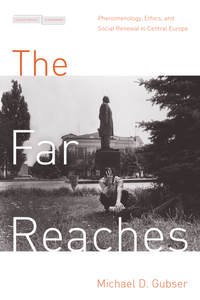
One of the guiding threads of Gubser’s book on the Central European origins of phenomneology (The Far Reaches) is that the philosophical movement was always an ethical movement as well. This preoccupation predisposed its adherents to religious belief, especially Catholicism. In turn the conversions of his students had some surprising ramifications for Catholic relations with Judaism.
Husserl inherited the earnest late 19th century concern for the need to overcome nihilism with a moral, cultural, and spiritual renewal. His work showed a great deal of interest in the development of personal autonomy and responsibility through connection to a wider community. This emphasis became all the stronger after the tragedy of World War I. One of his sons died in the war, another came back severely handicapped. The rise of Nazism in his native Germany only strengthened Husserl’s emphasis on moral and societal conversion in his writings, culminating in his famous The Crisis of European Sciences.

The Far Reaches proposes that this stress upon self-transcendence was analogous to religious conversion:
“Phenomenology shares numerous characteristics with religious belief, including and ethical orientation to fixed values, an emphasis on the nonrelativity of truth, a concern about modern moral and cultural decay, and a desire to embed anomic individuals in communities of purpose. Even the central phenomenological concepts of intention, fulfillment, and transcendence afford ample room for a religious interpretation that finds glimmers of the eternal in the experiences of man.”
These goals are familiar to anyone who has spent any time reading and practicing Catholic Social Teaching. Therefore there’s no surprise in the fact that so many Catholics were drawn to Husserl’s teachings. It’s also not that strange that so many of his secular students were drawn to Catholicism.
Quite a few of these students had Jewish backgrounds. Gubser credits this fact with helping to change Catholic attitudes toward Judaism for the better:
“Also noteworthy is that a striking number of phenomenologists–among them Husserl, Reinach, Scheler, Stein, and Kolnai–were originally Jewish. Hildebrand too, though raised Catholic, had a Jewish grandmother. Hildebrand and Kolnai, as we will see, drew on both their religious and philosophical convictions to denounce Nazism and anti-Semitism from neighboring Austria, helping to make pre-Anschluss Vienna a center of Catholic anti-fascist activism. Edith Stein as well, herself one of the Nazis’ famous victims, called on Pope Pius XI to condemn the Nazi ‘war of destruction against the Jews.’ Phenomenology thus contributed to a novel Christian resistance to Nazi rule and to the gradual Catholic acceptance of Jews recently chronicled by John Connelly [in From Enemy to Brother].”
All that from the influence of one philosophical school on Catholicism?
The irony, from a phenomenological standpoint, is that some of the most salutary influences of a philosophy upon society are not always intentional.
For now you can take a look at more connections between phenomenology and Catholicism here.
My earlier posts on Gubser’s fascinating book can be found here and here.











